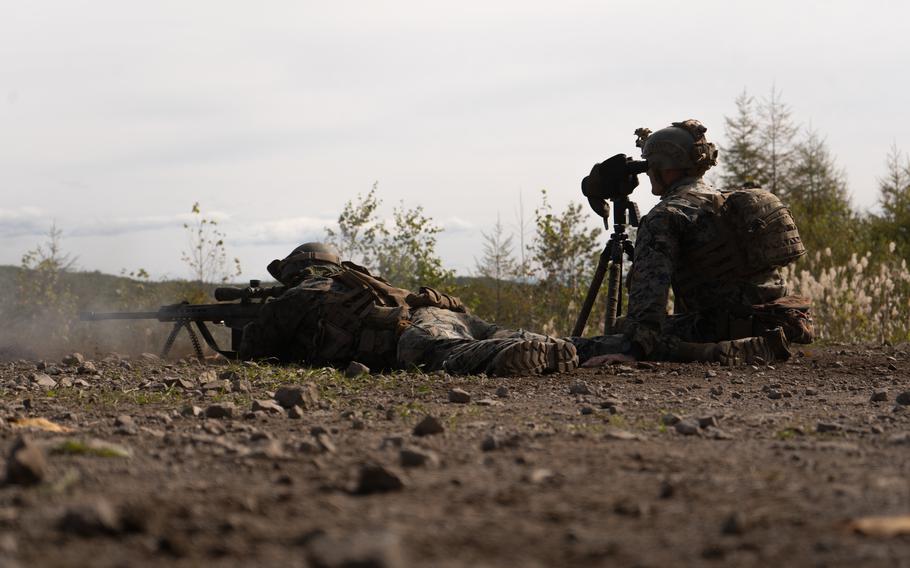
Marine Corps Sgt. Ryan Lauritsen, left, and Cpl. Jack Secrest, right, are scout snipers training at a live-fire range during Resolute Dragon 22 on Shikaribetsu Maneuver Area, Hokkaido, Japan, on Oct. 6, 2022. (Scott Aubuchon/U.S. Marine Corps)
WASHINGTON — The Marine Corps has phased out its elite scout sniper platoons as part of a large-scale redesign of the service’s infantry battalions to adapt to future warfare, service officials said Wednesday.
Scout sniper platoons have been part of Marine Corps infantry battalions since the 1940s and their exploits as the service’s elite marksman units were seen during every major U.S.-involved conflict since World War II. The platoons were responsible for carrying out various operations, such as targeting enemies from a distance and aiding with reconnaissance.
However, as the Marine Corps modernizes and adapts for future warfare, giving infantry battalions more information-gathering capability is more necessary than giving them standalone scout sniper platoons, service officials said. The legacy platoons are being replaced by units that specialize more in all-weather reconnaissance — a need revealed by warfighter tests and experiments.
“The Marine Corps is constantly evaluating our organizational structure and capabilities to ensure we are prepared for the future fight,” said Capt. Ryan Bruce, a Marine spokesman.
But the Marines emphasized they are not getting rid of snipers. Officials said commanders will still have long-range rifle capabilities available in the field, when needed.
“Precision rifle capability will remain within the infantry company and the Marine Corps will continue to maintain school-trained snipers within Marine reconnaissance and Marine special operations units,” Bruce said.
The new scout platoons will have roughly two dozen troops — including a first lieutenant and infantry gunnery sergeant — and will be part of reconnaissance battalions rather than infantry battalions. With the transition, the Marine Corps is also creating a reconnaissance sniper specialty and maintaining “designated marksmen” and sniper weapons in rifle companies.
The scout sniper platoons were introduced in 1943 during World War II. The first steps away from dedicated scout sniper platoons began in 2020, but the Marine Corps this week directed the full transition to happen immediately, Bruce said.
The move has drawn criticism from some retired Marine snipers.
“We hoped against hope that this day would never come,” retired Marine Tim Parkhurst, president of the USMC Scout Sniper Association, wrote in a letter to the group’s members this week. “Marine scout snipers have at all times since World War II been a tremendously cost-effective force multiplier and agent of change on the battlefield.”
He wrote the decision weakens the Marine Corps' warfighting capability.
“Replacing an 18-man scout sniper platoon with a 26-man scout platoon will not solve the ‘all-weather, information-gathering’ problem,” Parkhurst wrote. “Retaining the skill set and the combat capability of scout snipers by offering a viable career path to scout snipers and providing them with more engaged leadership might. We urge the commandant of the Marine Corps to reconsider this ill-advised policy decision.”